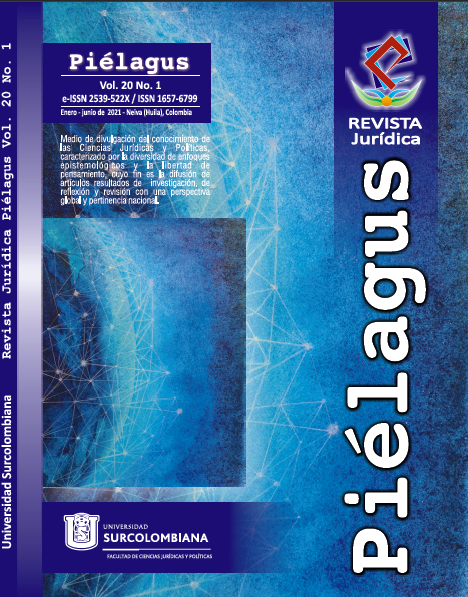Legal effect of the IACHR Court decision on the sanctioning competence of the Comptroller's Office over elected officials
Efecto jurídico del fallo de la Corte IDH en la competencia sancionadora de la Contraloría a funcionarios de elección popular
##plugins.themes.bootstrap3.article.main##
The research article deals with the legal effects of the IACHR Court decision on the sanctioning competence of the Comptroller's Office over elected officials. The objectives are to describe the sanctioning procedure in Colombia of the Comptroller's Office with respect to popularly elected officials, to identify the scope of the proposals of the IACHR Court ruling of July 8, 2020 in the Petro vs. Colombia case in relation to the sanctioning competence of the Comptroller's Office and to determine, the legal effect for Colombia in relation to the regulatory adequacy and the power of criminal judges to sanction popularly elected officials.
To achieve this, a qualitative methodology with a descriptive analytical approach is proposed, using the bibliographic review of academic studies on the subject, and primary sources such as the IACHR Court decision on the Petro vs. Colombia case with related regulations. It is hoped that the legal consequences relating to the adequacy of the domestic legal order will be analyzed on the basis of the Court’s ruling, in such a way that elected officials cannot be dismissed or disqualified by decisions of administrative authorities without that implying a blow to the competency, constitutional and legal structure of the Colombian State.
Downloads
##plugins.themes.bootstrap3.article.details##
I. Asamblea Nacional Constituyente. (4 de Julio de 1991). Constitución Política de Colombia. https://www.constitucioncolombia.com/titulo-10/capitulo-1/articulo-267#:~:text=Art%C3%ADculo%20267.,o%20bienes%20de%20la%20Naci%C3%B3n
II. Colectivo de abogados Jose Alvear. (23 de diciembre de 2013). Decisiones de la Comisión Interamericana son de obligatorio cumplimiento. https://www.colectivodeabogados.org/decisiones-de-la-comision-interamericana-son-de-obligatorio-cumplimiento/#:~:text=La%20Corte%20Constitucional%20al%20respecto,Derechos%20Humanos%20son%20vinculantes%20porque%3A&text=Colombia%20hace%20parte%20de%20la,Con
III. Contraloría General de la República. (19 de junio de 2019). Resolución reglamentaria No. 0029. https://normativa.colpensiones.gov.co/colpensiones/docs/pdf/resolucion_contraloria_reg0029_2019.pdf
IV. Corte IDH. (2020). Caso Petro Urrego vs. Colombia. https://www.corteidh.or.cr/docs/casos/articulos/resumen_406_esp.pdf
V. Corte Interamericana de Derechos Humanos -CIDH-. (2018). ABC de la Corte Interamericana de Derechos Humanos: El qué, cómo, cuándo, dónde y porqué de la Corte Interamericana, Corte Interamericana de Derechos Humanos. https://www.corteidh.or.cr/sitios/libros/todos/docs/ABCCorteIDH.pdf
VI. Cristancho, J. P. (2018). El Control Fiscal en Colombia y la Constitución de 1991. https://repository.usta.edu.co/bitstream/handle/11634/18589/2018juancristancho.pdf?sequence=7&isAllowed=y
VII. Cuéllar-Cedeño, A., y Torres-Carvajal, J. C. (2020). El estado colombiano y su incumplimiento de la obligación internacional de adecuación de las normas internas a la Convención Americana de Derechos Humanos. https://repositorio.unbosque.edu.co/handle/20.500.12495/3941
VIII. Dalla, A. (2011). Los derechos políticos en el Sistema Interamericano de Derechos Humanos. https://www.corteidh.or.cr/tablas/r30080.pdf
IX. Machado, D. (2014). Caso Gustavo Petro: flagrant system error. https://biblat.unam.mx/hevila/Nuevasociedad/2014/no250/1.pdf
X. Maldonado-Narváez, M. I. (2014). El control fiscal y su ajuste dentro del Estado Social de Derecho. Revista Facultad de Derecho y Ciencias Políticas, 44(120), 129-152.
XI. Mendieta, D. (2021). La sentencia de la Corte Interamericana de Derechos Humanos en el caso Petro: la orden más difícil de cumplir para (Colombia the Judgment of the Inter-American Court of Human Rights in the Petro Case: the Most Difficult Order for Colombia to Comply With). Social Science Research Network. http://dx.doi.org/10.2139/ssrn.3772296
XII. Martínez, T. Í. (2019). La Consolidación del nuevo sistema penal acusatorio con apego a los derechos humanos. [Tesis de maestría, Universidad Autónoma del Estado de Hidalgo]. http://dgsa.uaeh.edu.mx:8080/bibliotecadigital/bitstream/handle/231104/2512/La%20consolidaci%c3%b3n%20del%20nuevo%20sistema%20penal%20acusatorio%20con%20apego%20a%20los%20derechos%20humanos..pdf?isAllowed=y&sequence=1
XIII. Téllez, H. (2020). Evolución jurídica del Control Fiscal y del Proceso de Responsabilidad Fiscal en Colombia 1991-2020. https://repository.ucc.edu.co/bitstream/20.500.12494/28314/1/2020_evolucion_control_fiscal.pdf
XIV. Villací, Á., y Arroyave, F. (2017). Funcionalidad del Control Fiscal en Colombia. https://bdigital.uexternado.edu.co/bitstream/001/675/1/JIA-spa-2017-Funcionalidad_del_control_fiscal_en_Colombia.pdf
XV. Villalba, J. C., y González, A. (2014). REFLEXIONES SOBRE EL “CASO PETRO”. Revista Prolegómenos - Derechos y Valores, 17(34), 9-12. https://doi.org/10.18359/dere.791
XVI. Auto 1660 de 2020. [Contraloría delegada intersectorial 3 unidad de responsabilidad fiscal de regalías]. Por el cual se abre proceso ordinario de responsabilidad fiscal no. prf 801112-2019-34962. 14 de diciembre de 2020.
XVII. CConst, C-716/02, M. P. M. Monroy Cabra (Corte Constitucional 3 de septiembre de 2002).
XVIII. CConst, C-338/14, M. P. A. Rojas Ríos (Corte Constitucional, junio 04 de 2014).
XIX. CConst, SU431/15, M. P. L. Guerrero Pérez (Corte Constitucional, julio 09 de 2015).
XX. CConst, C-101/18, M. P. G. Ortiz Delgado (Corte Constitucional
de octubre de 2018).















